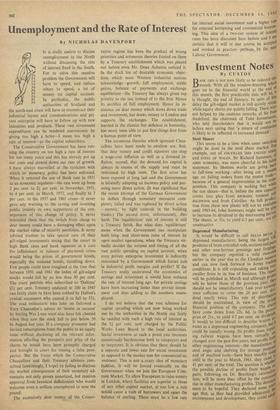Unemployment and the Rate of Interest
By NICHOLAS DAVENPORT IT is really useless to discuss unemployment in the North without discussing the rate
The Conservative Government has been run- ning the country on too high a rate of interest for too many years and this has already put up our costs and slowed down our rate of growth. I have always marvelled at the cynicism with which its monetary policy has been enforced. When it restored the use of Bank rate in 1951 as an economic regulator—the rate went up from 2 per cent. to 21 per cent. in November, 1951, to 4 per cent. in March, 1952, and finally to 7 per cent. in the 1957 and 1961 crises—it never gave any warning to the saving and investing public (mainly its own supporters) of the con- sequences of this change of policy. It never reminded them that the switch from cheap to dear money could have a damaging effect upon the market value of security portfolios. It never advised trustees to take special care of their gilt-edged investments seeing that the resort to high Bank rates and bank squeezes as a cure for inflationary or balance of payments crises would bring the prices of government bonds, especially the undated bonds, tumbling down. Few people could have imagined at the time that between 1951 and 1961 the index of gilt-edged stocks would fall by no less than 30 per cent. The crazy patriots who subscribed to Daltons' (21 per cent. Treasury undated) at 100 in 1947 can fairly claim to have been robbed by Dalton's cynical successors who caused it to fall to 351. The mad enthusiasts who later on followed a Tory Chancellor's advice to 'invest in success' by buying War Loan must also have felt cheated when they saw the stock fall to just below 50 in August last year. If a company promoter had invited subscriptions from the public to an equity issue without disclosing all the relevant infor- mation affecting the prospects and price of the shares he would have been promptly charged and brought to court for issuing a false pros- pectus. But the fraud which the Conservative Chancellors and their Treasury advisers com- mitted (unwittingly, I hope) by failing to disclose the market consequences of their monetary ad- ventures not only passes unnoticed, but receives approval from fanatical deflationists who would welcome even a million unemployed to save the pound.
The excessively dear money of the Conser- vative regime has been the product of wrong priorities and erroneous theories foisted on them by a Treasury establishment which was played out before even Mr. Dean Acheson noticed it. In the stock list of desirable economic objec- tives which most Western industrial nations acknowledge—growth, full employment, stable prices, balance of payments and exchange equilibrium—the Treasury has always given top priority to the last instead of to the first. Hence its sacrifice of full employment. Hence its in- sistence on dear money which slows down trade and investment, but draws money to London and supports the exchanges. The establishment, learned in the classics but deficient in humanity, has never been able to put first things first from a human point of view.
The erroneous theories which ignorant Chan- cellors have been made to swallow are, first, that dear money and credit squeezes can stop a wage-cost inflation as well as a demand in- flation; second, that the demand for capital is always in excess of the supply and must be restrained by high rates. The first error has been exposed at long last and the Government is belatedly adopting an incomes policy and pur- suing more direct action. (It was significant that the recent attempt of the German Government to deflate through monetary measures com- pletely failed and was replaced by direct action —namely, by tight controls in the building trades.) The second error, unfortunately, dies hard. The `equilibrium' rate of interest is still a Treasury fetish. But what does 'equilibrium' mean when the Government can manipulate both long- and short-term rates of interest by open market operations, when the Treasury vir- tually decides the volume and timing of all the vast public spending on capital account, when even private enterprise investment is indirectly restrained by a Government which forces cuts in industrial profit margins and profits? If the Treasury really understood the economics of savings and investment it would have reduced the rate of interest long ago, for private savings have been increasing faster than private invest- ment and thus adding to the numbers unem- ployed.
I do not believe that the vast schemes for capital spending which are now being worked out by the authorities in the North can fairly be saddled with such a high rate of interest as the 5i per cent, now charged by the Public Works Loan Board to the local authorities. Social investment at such a penal rate becomes monstrously burdensome both to ratepayers and to taxpayers. It is obvious that there should be a separate and lower rate for social investment as opposed to the market rate for commercial in- vestment. This is not a crazy idea of monetary faddists. It will be forced eventually on the Government when we join the European Corn- rnon Market. To allow Europeans to raise money in London, where facilities are superior to those of any other capital market, at too low a rate would cause a rush of borrowers and upset the balance of sterling. There must be a low rate for internal social investment and a higher rate for external borrowing and commercial borrosg- ing. This idea of a two-tier system of interest rates has been discussed here before and I 3111 certain that it will in due course be accePted and worked in practice—perhaps by the ne/11 Labour Government.


































 Previous page
Previous page